Peace operations around the world, a detailed analysis of some of the ongoing peace operations across the globe.
![[HOME]](images/blank.gif)
MINUSTAH
-
Haiti: the context
Haiti
The Republic of Haiti is located on an island split into two states: the Dominican Republic and Haiti (27,750 km2), and has a population of 10,4 million people. A former French colony, it is still, along with Creole, an official language of the Republic. Ranked 161 out of 187 on the Human Development Index, Haiti is the poorest country of the Americas and has faced major challenges throughout its history.
Christopher Colombus discovered the “new world” in Môle Saint-Nicolas, situated on the North-Western coast of Haiti. Later, the French crown settled in Haiti after the territory was disputed between various European powers. Over the course of the following centuries, Haiti played a major role in the sugar cane production and, as a result, tens of thousands of African slaves arrived on the island, soon outnumbering the white colonial population. The successful slave movement of Haiti lead to its independence in 1804 and was followed by several years of unrest until the election of the dictator Francois Duvalier, also known as “Papa Doc”, in 1957. In power until his death in 1970, Duvalier ruled based on a purged military, a particularly aggressive rural militia, the use of personality cult and voodoo. The following decades were characterised by successive elections and coups, culminating in an acute state of tension between the government of Aristide and the opposition in the early 2000s. It is the 2004 revolt in Northern Haiti that drove the president into exile, gave place to extreme violence and marked the beginning of the presence of the United Nations Stabilisation Mission in Haiti (MINUSTAH). In addition to its weak government, huge sanitary crisis, poor economy and low educational level, the Republic of Haiti was shaken by an unprecedented earthquake in 2010 that drove the country into an acute state of chaos, and that justified even more the presence of the MINUSTAH.
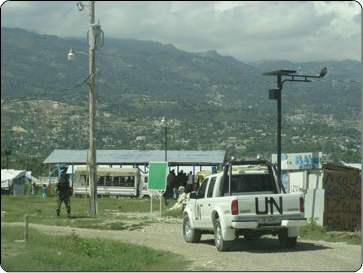
-
Mandate, History and Resolutions
MINUSTAH Mandate
United Nations’ interventions in Haiti go as far as September 1993, two years after the 1991 military coup left the country in an unprecedented state of disorder. The first peacekeeping mission, MINUAH (Missions des Nations Unies en Haiti – United Nations Mission in Haiti) was never actually fully deployed for the Haitian authorities refused to cooperate and, as a result, the mission had to be aborted.
Later, from 1994 to 2001, MINUAH was able to conduct its actions of peacekeeping, and moderate advances were made in the development of a civil society and politics based on democracy. General instability and political crises nonetheless did not enable for a greater fulfilment of MINUAH’s mission. In the early 2000s, after the President Aristide was elected with a voting participation rate of 10%, a climate of tension and violence between the government and the opposition rapidly escalated. By February 2004, an armed revolt erupted in the Northern part of the country, and rapidly spread across several cities, eventually forcing President Aristide into exile. The interim President allowed for the deployment of a Multinational Interim Force (MIF), and by June 1st the United Nations Stabilisation Mission in Haiti (MINUSTAH) was established by the Security Council resolution 1542.
The mission was formed to support the Transitional Government in ensuring a secure and stable environment; to assist in monitoring, restructuring and reforming the Haitian National Police; to help with comprehensive and sustainable Disarmament, Demobilization and Reintegration (DDR) programmes; to assist with the restoration and maintenance of the rule of law, public safety and public order in Haiti; to protect United Nations personnel, facilities, installations and equipment and to protect civilians under imminent threat of physical violence; to support the constitutional and political processes; to assist in organizing, monitoring, and carrying out free and fair municipal, parliamentary and presidential elections; to support the Transitional Government as well as Haitian human rights institutions and groups in their efforts to promote and protect human rights; and to monitor and report on the human rights situation in the country.
In the following years, the mandate of MINUSTAH, its concept of operations and the authorized strength were adjusted by the Security Council on several occasions to adapt to the changing circumstances on the ground and to the evolving requirements as dictated by the political, security and socio-economic situation prevailing in the country. For details, see Security Council resolutions 1608(2005) , 1702(2006) , 1743(2007) ,178(2007) and 1840(2008).
Following the devastating earthquake which hit Haiti on 12 January 2010, the Council, by its resolutions 1908 of 19 January and 1927 of 4 June, increased the overall force levels of MINUSTAH to support the immediate recovery, reconstruction and stability efforts.
Thankfully, seeing as the security situation in Haiti had improved, the overall force levels of MINUSTAH were reduced, including most recently by Security Council resolution 2070 of 12 October 2012 and Security Council resolution 2119 of 10 October 2013.
With a budget of US $576,619,000for its maintenance for the period July 2013 to June 2014, the MINUSTAH mission counts with a staff of 5,165 troops and 2,466 UN Police, 362 international civilians, 1,235 local civilians and 165 United Nations Volunteers (UNV).
-
Gender situation in Haiti - MINUSTAH and the Gender perspective
MINUSTAH and the Gender perspective
As in many other parts of the world, the gender situation in Haiti is very much related to violence and lack of equal opportunities for women. Poverty, instability, and disrupted social structures often go hand in hand with gender violence, and the earthquake that shook Haiti in 2010 only worsened the situation. Urban insecurity, the promiscuity in camps for Internally Displaced Persons (IDPs), and destroyed infrastructures aggravated an already rampant sexual and gender based violence in Haiti. Moreover, the security and judiciary sectors’ capacities at dealing with gender violence cases are weak: courts, prosecution offices and police stations are often unable to properly handle cases, so that the vast majority of reported rapes are never properly adjudicated. The lack of opportunities for an active participation of women in public life is a further major challenge to the incorporation of women’s perspectives at all levels in Haiti’s reconstruction, stabilisation and development process.
In the past few years, a gender vision has been gradually introduced in the country’s agenda and some advances are ongoing. For instance, the Ministry for Women’s Affairs and Women’s Rights developed, while a working group on gender issues, in which UN and civil society actors participate, was created and is coordinated by the Ministry. MINUSTAH’s mandate also includes the provision of assistance to the Government. It does so along with other UN programs and agencies, such as the United Nations Entity for Gender Equality and the Empowerment of Women (UN-Women) and UNDP, to technically support an office for gender equity in Parliament and, as such, promote the adoption of a gender-sensitive legislation. Among the projects the Haitian Government undertook with the Mission are several efforts to improve prevention and response to sexual and gender based violence. For example, it established proper locations to receive victims inside IDP camps, promoted special units within the Haitian Police, and created a Mobile Gender Unit inside the IDP camps.
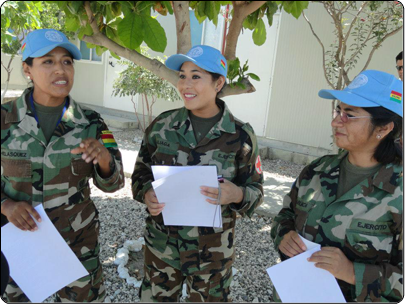
The efforts of MINUSTAH in Gender promotion
Similarly to other UN missions, MINUSTAH’s participation is articulated in three components: the Civilian, Police, and Military. Each component has a crucial role in gender promotion, even if their potentialities are not yet fully applied.
The Civilian component of MINUSTAH is meant to be particularly aware of the gender issue, for it has a specific office in charge, the Gender Unit, which is primarily responsible for promoting, facilitating and monitoring the incorporation of a gender perspective in the implementation of the Mission’s mandate. The Gender Unit also is tasked to support the efforts of the Government and civil society organisations in the promotion of gender and fight against sexual violence. All such assignments are accomplished in close collaboration with other sections of the mission, such as Human Rights and the Community Violence Reduction Section, as well as together with other UN partners. For instance, the work of monitoring and reporting sexual and gender based violence cases conducted by the Human Rights office, together with the Gender office and the Joint Mission Analysis Centre that deals with SGBV data collection, lead to the elaboration of a report on the capacities of judicial Haitian actors to respond to SGBV cases and fight against Impunity (see A Profile of Police and Judicial Response to Rape in Port-au-Prince, June 2012 and August 2013). The UN efforts to promote a gender perspective across the system have led to the creation of a Gender Thematic Group, headed by UN-Women, and composed of sub-clusters, such as the sexual and gender-based violence data collection, in coordination with the local Government and UNFPA. UNHCR and UNDP also work on the fight against sexual and gender based violence, the former focusing on IDP camps, and the latter on the empowerment of women.
The Police component of MINUSTAH, UNPOL, has established a Gender Adviser in 2010, working in close collaboration with the Gender Unit of the Mission. This is quite emblematic of the efforts of UNPOL in preventing all forms of sexual and gender base violence, including domestic abuse. However, the primary role of UNPOL is to mentor and advise the Haitian National Police (HNP), for it is the only one that can directly intervene and actuate when sexual and gender based violence cases are reported. UNPOL has thus a vital role in training Haitian personnel at different levels. Notably, UNPOL carried out training at the Haitian Police Academy, and implemented a project to support the National Police in building a National Coordination Office for Gender and Women’s Affairs. Furthermore, in 2011 UNPOL established a Gender Mobile Unit, which is deployed on the ground and covers several IDP camps. In this way it can support the police in correctly assisting victims, and it facilitates the reference system to medical structures, UN partners and civil society specialised actors.
The military component in MINUSTAH maintains control and security within the area of responsibility of the mission, contributes to the work of local authorities, and provides humanitarian assistance in case of natural disaster. Along with the Security Council resolution 2119 (2013), in the past few years the military component continued the reduction of its personnel, achieving the strength of 5,021 troops by the end of June 2014. Notwithstanding this mandated reduction of personnel, the military Force of MINUSTAH continues to maintain a strong potential for gender promotion, even if it is not yet completely implemented. According to a vast research conducted by RESDAL in 2012/2013, military contingents of MINUSTAH proved to be aware of the operational need of gender promotion, and the UNSCR 1325. This standpoint was different from the one encountered by the RESDAL team in 2011, when military contingents appeared to be barely familiar with gender aspects in peacekeeping. The appointment of a Gender Focal Point in each military unit certainly helped to raise awareness and promote knowledge of the issue. Yet gender promotion continues to be mainly associated with good conduct and discipline, as such avoiding cases of Sexual Exploitation and Abuse, and to women’s empowerment and health issues in CIMIC (Civil-Military Cooperation) activities. In addition, in MINUSTAH, as in other peacekeeping missions, a gender perspective and approach are not yet applied to all interventions made by the Force. Military contingents are beginning to perceive the importance of having women personnel with equal roles as men personnel in the Mission. However, the understanding that every military initiative of the MINUSTAH’s mandate has an impact on gender promotion is not very widespread. The military engineering Unit is, for example, directly affects the situation of women in Haiti. They can rehabilitate commercial activities in making roads safer, improve health structures, give privacy structures in IDP camps, increase the amount of schools… All such initiatives are very important to the development of women in Haiti and are directly connected to the Military mandate of MINUSTAH.
See also:
A Profile of Police and Judicial Response to Rape in Port-au-Prince, June 2012 Human Rights Section, http://www.minustah.org/a-profile-of-police-and-judicial-response-to-rape-in-port-au-prince/
Report of the Secretary-General on the United Nations Stabilization Mission in Haiti 7 March 2014, http://www.minustah.org/wp-content/uploads/2014/03/N1424888.pdf
-
News
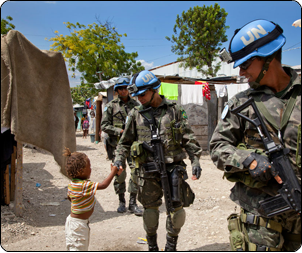
Haiti: Amid ongoing humanitarian problems, Security Council extends UN mission for another year
The United Nations Security Council today adopted a resolution renewing the mandate for the UN Stabilization Mission in Haiti (MINUSTAH) in the Caribbean nation, urging political stakeholders in the country to fully commit to the democratic process and calling on international donors to strengthen their efforts in helping the Government.
México podría enviar Cascos Azules a Haití
Durante una reunión con el canciller de Haití, José Antonio Meade informó que México podría enviar a sus primeros cascos azules en Misiones de Paz a la isla caribeña.
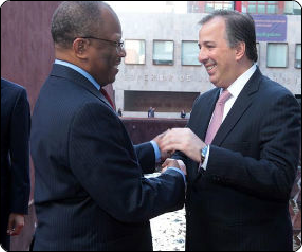
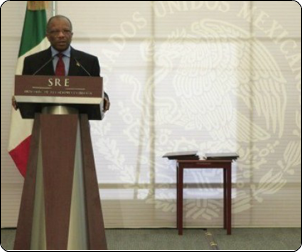
México prevé enviar tropas a Haití para ayuda humanitaria
Durante una reunión entre el titular de la Secretaría de Relaciones Exteriores (SRE), José Antonio Meade y el ministro de Asuntos Extranjeros y Culto de Haití, Pierre Duly Brutus analizaron la posibilidad de enviar tropas que funjan como “cascos azules” y apoyen en labores humanitarias en Haití.







